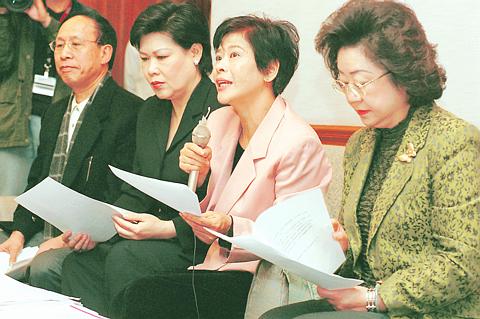Politicians and public servants should get out of media programming and be restricted from managing media or the producing and hosting of TV or radio programs, a media watch group yesterday said.
He Te-feng (賀德芬), president of Taiwan Media Watch Foundation (媒體觀察基金會) told a press conference at the Legislative Yuan yesterday that the tendency for public servants, election candidates elected officials to take part in media reporting or the production or hosting of TV and radio programs was "strangling the fair and detached stance that mass media is supposed to have."
He said that Taiwan's media situation had long been intertwined with political party and military interests. Of the three major terrestrial TV networks, TTV, CTV and CTS one is substantially owned by the KMT, one by the military and one by the government. All three, He said, are obviously favoring the KMT in election-related coverage, while the fourth terrestrial channel, FTV, the president of which is a member of the DPP's central standing committee, has shown a clear bias towards the DPP.

PHOTO: CHIANG YING-YING, TAIPEI TIMES
He called on politicians to respect the independence of the fourth estate, while the foundation called for a petition to force political parties and public servants out of the media.
The group wants such regulations be included in the Political Party Law (政黨法) and the Civil Servant Conflict of Interest Prevention Bill (公職人員利益衝突迴避法). A proposal to do which will be reviewed in the legislature next Friday.
The proposal would restrict public servants and election candidates from holding posts as shareholders, directors or managers of media-related enterprises or from working as producers, anchorpeople or reporters. The government and political parties would also be prevented from investing in mass media enterprises.
DPP legislators Fan Sun-lu (
Other politicians and academics were, however, less enthusiastic about such restrictions.
Chen Shei-saint (陳學聖), a KMT legislator and current spokesman for the Lien Chan (連戰)-Vincent Siew (蕭萬長) presidential campaign said there could be forces other than politics that have been influencing Taiwan's media environment. Chen himself hosts various radio and TV programs, some of which are current affairs-based. He said there were media that were driven by commercial interests, and others by religious influences, "so political restriction cannot guarantee media independence."
"I have no answer for the question, but I also look forward to new plans for establishing a bias-free media," he said.
Chen said the most effective way to do this is through individual self-discipline. "When I host a program, I will adjust my criteria to maintain balance. And if I am biased, it would be reflected by the ratings of my program."
Su Herng (
She said that although maintaining an independent, interest-free media environment is a basic premise of media reform, in reality it is almost impossible to block politicians from media intervention. A longer-term direction is to make all media, including cable TV and the Internet, more diverse and accessible, she said.
In terms of legal regulation, Su said a notion of enhancing equal rights to use the media, rather than restriction, should be focused. Studies on European and Australian media regulation have shown a mechanism could be established to enhance accessibility, she said.

The CIA has a message for Chinese government officials worried about their place in Chinese President Xi Jinping’s (習近平) government: Come work with us. The agency released two Mandarin-language videos on social media on Thursday inviting disgruntled officials to contact the CIA. The recruitment videos posted on YouTube and X racked up more than 5 million views combined in their first day. The outreach comes as CIA Director John Ratcliffe has vowed to boost the agency’s use of intelligence from human sources and its focus on China, which has recently targeted US officials with its own espionage operations. The videos are “aimed at

STEADFAST FRIEND: The bills encourage increased Taiwan-US engagement and address China’s distortion of UN Resolution 2758 to isolate Taiwan internationally The Presidential Office yesterday thanked the US House of Representatives for unanimously passing two Taiwan-related bills highlighting its solid support for Taiwan’s democracy and global participation, and for deepening bilateral relations. One of the bills, the Taiwan Assurance Implementation Act, requires the US Department of State to periodically review its guidelines for engagement with Taiwan, and report to the US Congress on the guidelines and plans to lift self-imposed limitations on US-Taiwan engagement. The other bill is the Taiwan International Solidarity Act, which clarifies that UN Resolution 2758 does not address the issue of the representation of Taiwan or its people in

US Indo-Pacific Commander Admiral Samuel Paparo on Friday expressed concern over the rate at which China is diversifying its military exercises, the Financial Times (FT) reported on Saturday. “The rates of change on the depth and breadth of their exercises is the one non-linear effect that I’ve seen in the last year that wakes me up at night or keeps me up at night,” Paparo was quoted by FT as saying while attending the annual Sedona Forum at the McCain Institute in Arizona. Paparo also expressed concern over the speed with which China was expanding its military. While the US

SHIFT: Taiwan’s better-than-expected first-quarter GDP and signs of weakness in the US have driven global capital back to emerging markets, the central bank head said The central bank yesterday blamed market speculation for the steep rise in the local currency, and urged exporters and financial institutions to stay calm and stop panic sell-offs to avoid hurting their own profitability. The nation’s top monetary policymaker said that it would step in, if necessary, to maintain order and stability in the foreign exchange market. The remarks came as the NT dollar yesterday closed up NT$0.919 to NT$30.145 against the US dollar in Taipei trading, after rising as high as NT$29.59 in intraday trading. The local currency has surged 5.85 percent against the greenback over the past two sessions, central